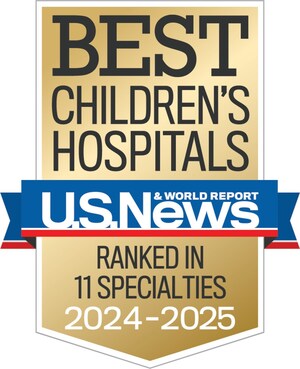Cincinnati Children's Psychologists Advise Adults on How to Talk with Children about Terrorist Attacks in Orlando
CINCINNATI, June 13, 2016 /PRNewswire-USNewswire/ -- As the nation watches the reports about the recent terrorist attacks in Orlando, many people may find themselves feeling anxious, worried, saddened or otherwise concerned.
While adults may know how to express these feelings, often they do not know how to talk with children about the way the children are feeling.
Psychologists at Cincinnati Children's Hospital Medical Center provide the following tips to help adults talk with children about the attacks.
- Talk about the events with your child. Silence isn't comforting in crisis situations and suggests that what has occurred is too horrible to even speak of. After a major crisis, even very young children have likely already heard what has happened – but they may not understand what it means.
- Follow your child's lead in communicating. Let your child talk first, ask what they have heard about the terrorist attacks. Correct inaccurate information/conclusions. Listen to their questions and answer only what they ask. Young children want simple, but accurate answers. It's important not to provide more information than the child asks for – you might overwhelm them with too much information. Speak at your child's developmental level – trust your gut about what they can handle.
- Start by asking your child what he or she has already heard about the events and what questions or concerns they have. Listen for misinformation, misconceptions and any underlying fears or concerns. If the child expresses worries, sadness or fears, tell them what adults are doing to keep them safe but don't provide false reassurance or dismiss their concerns. Help them identify strategies to cope with difficult feelings.
- Minimize your child's exposure to media (television, radio, print, internet, social media) and if they do watch, consider recording, screening and watching with them. The younger the child, the less media exposure she/he should have and you may choose to eliminate all exposure for very young children. Even if they appear to be engrossed in play, children often overhear or see what you are watching on TV or listening to on the radio and may be exposed directly as the news evolves through the internet or social media. While children may seek and benefit from basic information about what happened so that they can understand what is happening in their world, they (and adults) don't benefit from graphic details or exposure to disturbing images or sounds. In the aftermath of a crisis is a good time to disconnect from all media and sit down together and talk as a family. Explain to your child that media coverage/social media can sometimes trigger fears of the terrorist attacks happening again and also spread rumors. Let them know they can distract themselves with activities (e.g., play DVDs or videotapes of their favorite shows or movies instead) or can talk to you about how they are feeling.
- With older children and teens, watch what they watch and ask them about what they have seen on the internet or what they have heard through social media technologies (text, Facebook, Twitter) in order to get a better sense of their thoughts, fears, concerns, and point-of-view.
- Seize opportunities for communication. Use news breaks that interrupt family viewing or newspaper/web images as opportunities to open conversation. Be available to talk about children's feelings, thoughts, and concerns, and reassure them of their safety and of plans to keep them safe. If faith is important to your family, you can use this time to talk about spiritual beliefs to help cope.
- Encourage your child to ask questions now and in the future, and answer the questions directly. Like adults, children are better able to cope with a crisis if they feel they understand it. Question-and-answer exchanges provide you with the opportunity to offer support as your child begins to understand the crisis and the response to it.
- Share your feelings about the terrorist attacks with your child and the strategies you have used to cope with your concerns, sadness, or other difficult feelings. If you feel overwhelmed and/or hopeless, look for some support from other adults before reaching out to your child.
- Reassure the child that feeling sad, worried or angry is okay. Let your child know that it is all right to be upset about something bad that happened. Use the conversation to take the opportunity to talk about other troubling feelings your child may have.
- Don't feel obligated to give a reason for what happened. Although adults often feel the need to provide a reason for why someone committed such a crime, many times they don't know. It is okay to tell your child that you don't know why at this time such a crime was committed.
- Take care of yourself. Confide in other adults about the intensity of your fears/anxieties. Children pick up on cues from adults. If we can remain calm and continue with our regular routines, children's fears will be eased.
- If you have concerns about your child's behavior, contact his or her pediatrician, other primary care provider, or a qualified mental health care specialist.
For additional tips families can also visit the National Child Traumatic Stress Network by going to: http://www.nctsn.org/trauma-types/terrorism
About Cincinnati Children's
Cincinnati Children's, a non-profit, pediatric, academic medical center established in 1883, is internationally recognized for improving child health and transforming delivery of care through fully integrated, globally recognized research, education and innovation. It is one of the top three recipients of pediatric research grants from the National Institutes of Health, ranked third in the nation among all Honor Roll hospitals in U.S. News and World Report's Best Children's Hospitals, and a research and teaching affiliate of the University of Cincinnati's College of Medicine. Its patient population includes the eight-county primary service area covering parts of Ohio, Kentucky and Indiana. A destination for children with complex medical conditions, it also served patients from all 50 states and nearly 70 countries during the past year. Additional information can be found at www.cincinnatichildrens.org. Connect on the Cincinnati Children's blog, via Facebook and on Twitter.
SOURCE Cincinnati Children's Hospital Medical Center
Related Links
WANT YOUR COMPANY'S NEWS FEATURED ON PRNEWSWIRE.COM?
Newsrooms &
Influencers
Digital Media
Outlets
Journalists
Opted In






Share this article